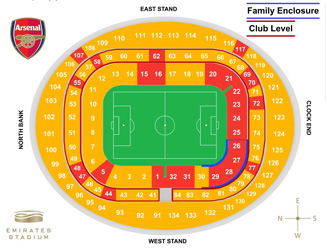Everyone will have seen the amounts being paid for three seasons of Premier League football by the TV companies in the new deal that begins in 2016. Remembering that all 20 of last season’s Premier League clubs made it into the top 40 of the recently published the Deloitte Football Money League, the extra income in the years to come is going to push more English teams towards the higher reaches in the list.
One potential positive of the deal, for the English game, is that it might actually make it more competitive. The extra Champions League income will not be as significant as it has been, paling into insignificance against domestic earnings (and remember this deal only covers UK broadcasting rights, there is more to come). What it could mean is that the top four does not become so predictable, as teams without European commitments can both put a stronger squad together and focus their efforts on their league programme. So we may see sides like Southampton, Everton, Tottenham (and any side that employs a good manager and gets the rub of the green) start to threaten the top four places (in recent years, largely the domain of Chelsea, Man Utd, Man City and Arsenal). Liverpool managed to break into it last season in this fashion after a period in the wilderness, displaced by Man City.
Now all this would be because of the ‘arms race’ when it comes to buying and paying the wages of players. And if that continues, as it surely will, both players and agents (and in-demand managers) will make even more obscene amounts of money. Either that, or certain clubs refuse to try to keep up with the Joneses and their owners extract profit where it is possible (on a significant scale, this would only be possible at Arsenal if Stan Kroenke decided to pay dividends, although that would mean 30% of the profits going to Alisher Usmanov, which is not something the American would do if he could avoid it).
However, with the sheer amount of money swilling around in the game thanks to the broadcasting income, there is growing pressure on clubs to address the issues related to the fans that attend matches. The Premier League have already ordered the clubs to contribute £250,000 each every season to helping their away supporters in some way. Arsenal do this by knocking off £2.50 from the price of every away ticket sold for Gunners’ Premier League away fixtures. Other clubs have initiatives such as providing free travel to matches. Yet, this is a drop in the ocean, and the extra revenue announced this week makes that drop even smaller.
The Football Supporters Federation have responded to the TV deal news by launching a petition (which will garner more publicity in time, as I suspect few fans are aware of it at the moment) re-iterating their demand for a policy of capping away ticket prices at £20 (this would cost a club like Arsenal £1 million a season, although in return, their own travelling supporters would benefit hugely) and additionally, lower prices for home fans and more support for grassroots football.
There is also a survey resulting from an Arsenal Supporters Trust meeting with Ofcom to sound out Arsenal fans about whether lower pricing for matches moved from Saturday 3pm kick offs to be shown on TV would influence their attendance at such matches. This can be competed here.
Any policy to benefit supporters from the new TV deal would have to come from the Premier League itself. The individual clubs certainly are not going to volunteer to give up income, even if it would benefit the game in terms of both the lower levels and the atmosphere at matches. For Arsenal, there is no incentive to help supporters financially. Home games sell out, and only very rarely do the club not shift their entire away allocation. The announcement to freeze ticket prices for next season was made by the club because we are close to zero inflation in the economy, the team are not doing as well in the league this season as in December 2013 when the last increases were announced, they could foresee a big jump in income from the new TV deal and the wave of poor publicity if they tried it would not have been good PR for the club that is supposed to care about its fans.
Yet, the Premier League has nothing to lose, financially, by telling the clubs what to do. They, after all, have delivered them the TV money through their putting together the packages put out to tender that have been carved up between Sky Sports and BT.
My personal fear is that we are moving to a similar model to the Spanish and Italian leagues whereby football matches are played for the convenience of television audiences rather than physical attendees. The consequences can be seen in the empty spaces at many games in both countries. And there is no doubt that for a number of clubs, televised matches reduces crowds. For Arsenal, this matters less as those empty seats have been paid for by season ticket holders who opt to stay at home and watch in the comfort of their front rooms (look at the sheer number of tickets for Sunday’s 4pm game – on BT Sport – available on ticket exchange in the image above. The orange areas indicate where seats are available and you can get pairs, threes and fours all over the stadium if you zoom in). However, specifically because season ticket holders cannot always make non 3pm Saturday matches, there is good reason for them to see some benefit from the new TV deal, in the form of less expensive season tickets. Never mind freezing the prices, the club can afford to reduce them.
Have your say by signing the FSF petition and completing the survey for all Arsenal fans.







